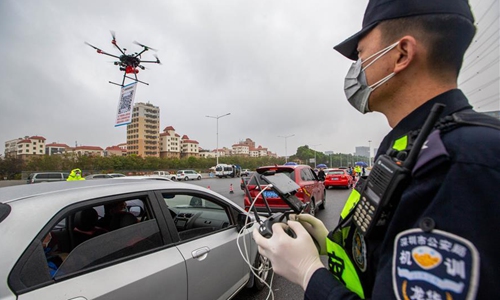HOME >> CHINA
High-tech facilitates fight against novel coronavirus
By Li Qiao, Liu Xin and Zhang Hui Source:Global Times Published: 2020/2/12 17:33:40

A police officer operates a drone carrying a QR code placard near an expressway toll station in Shenzhen, south China's Guangdong Province, Feb. 11, 2020. As a measure to help prevent and control novel coronavirus, an online register system for vehicles coming back to Shenzhen has been put into use since Feb. 8. To increase the efficiency, local police officers used drones to carry a QR code at the expressway exits for drivers to get registered with less contact with other people. (Photo by Lai Li/Xinhua)
The ongoing novel coronavirus epidemic may have wreaked havoc to many industries in China and hugely affected people's daily lives, however, it has greatly boosted the application of some high-tech products in the fight against the virus.
A district in Yinchuan, Northwest China's Ningxia Hui Autonomous Region, has 10 drones working to minimize exposure and improve efficiency in preventing the epidemic - four spraying sanitizer, four functioning as loudspeakers that remind residents to keep distance with each other and wear face masks, and two patrolling the streets.
Meanwhile, big data and artificial intelligence also have contributed a lot to epidemic monitoring to ensure public health in the country with a population of 1.4 billion.
People praised the rapid development of high technology and its flexible applications.
No touch
"The gentleman wearing red coat holding a white plastic bag in your right hand - yes, it's you. We found you are not wearing a face mask. Please wear it. If you do not have one, come to the patrol car by the street and get one."
This voice came from a drone flying above a street in Jinfeng district of Yinchuan.
Yang Dongdong, head of the drone team of Jinfeng district, Yinchuan, told the Global Times that using drones in promoting the prevention knowledge of the novel coronavirus could decrease the risk of the human-to-human transmission. And they are also convenient to operate in patrolling, Yang said.
It only takes two or three hours for drones to finish spraying sanitizer in some populous residential communities while the same work done by people could have taken at least two days.
A drone company in Yinchuan voluntarily joined the drone team to support prevention work of the novel coronavirus, Yang noted.
According to the Xinhua News Agency, Yi Jinyu, a community official in Yichun, East China's Jiangxi Province used a drone to carry out remote temperature measurement of residents.
The drone, equipped with an infrared thermal imaging lens, is capable of observing visible and infrared light and measuring body temperature from long distances. It is also equipped with a loudspeaker, allowing people on the ground to communicate with residents who are upstairs, avoiding direct contact.
Community staff contacted many residents as they went door-to-door to take their temperatures. Some residents worry about secondary infections.
As Xinhua reported, the drone is capable of measuring temperatures ranging from -10 C to 140 C in high precision with minimal error.
Compared with the domestic forehead thermometer and ear thermometer, Yi Jinyu found that the drone's measurement error is around 5 percent within three meters and 1 percent within one meter, which could meet the demand of thorough check.
The use of drones can enhance the efficiency of checking fevered residents, speed up the process and reduce the probability of secondary infection. The function of loudspeaker can efficiently carry out mobile publicity among buildings in the community and popularize epidemic prevention knowledge, Xinhua reported.
To avoid going out and getting infected, a woman in Ji'nan, capital city of East China's Shandong Province, operated a remote control car with a real-time camera and a loudspeaker to buy food for her.
Her video became popular on the internet and was lauded for her creativity and skills.
China has set up temperature checkpoints at various railway stations, subway stations and airports amid the novel coronavirus outbreak, but many checkpoints used temperature guns to check passed passengers which took a relatively long time.
Nanjing Glaucus Tech Company, a high-tech enterprise focusing on early warning, controlled and unmanned systems, produced infrared imaging cameras to be installed at public places.
Compared with temperature guns, infrared imaging cameras can simultaneously check people's temperature in less than a second. Its non-contact and real-time features made it more suitable at railway stations and airports, the company told the Global Times.
AI doctor
It is particularly important to use cloud computing, big data and other technologies for accurate data collection and analysis, which can effectively help the government to make scientific decisions, said experts.
Artificial intelligence and big data have already become an effective approach for the control of this epidemic.
YITU Technology, an artificial intelligence company based in Shanghai, told the Global Times through a statement that they are researching and developing an AI doctor system based on speech recognition, natural language processing and a knowledge map of the novel coronavirus.
This AI doctor system will have the functions of intelligent consultation, epidemic prevention publicity and big data epidemic monitoring.
This system can fulfill the huge demand of public consultation and relieve the medical staff, according to YITU. Relying on authoritative medical knowledge base, AI technology can cover the vast majority of knowledge related to the novel coronavirus, and avoid the shortage of online consultation staff.
The system uses big data to achieve epidemic monitoring. It can monitor users' data in different places in real-time and make statistical analyses of online questions, according to the company.
Posted in: SOCIETY